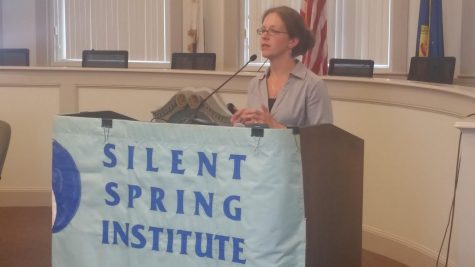
CCB MEDIA PHOTO: Dr. Laurel Schaider with the Silent Spring Institute updates the public on 2 new studies Thursday at Barnstable Town Hall
HYANNIS – The Silent Spring Institute announced the details of two new studies Thursday that will continue to evaluate the impact of emerging chemicals.
A project with the Center for Coastal Studies in Provincetown is already underway that will measure highly fluorinated chemicals in Cape Cod Bay estuaries.
Ten sub-watersheds will be examined, with the goal of finding ways to be more proactive in protecting coastal waters.
The Newton-based research group is also getting ready to launch a biomonitoring study for tracking everyday chemical exposures.
Those who sign up to participate will have their urine tested for 10 common household and environmental toxics, including BPA, parabens and triclosan.
Silent Spring will then send each participant a personalized digital report comparing results with others in the study and including tips for reducing exposures.
Researchers said they will use the data to characterize the general public’s exposure to toxic chemicals, identify sources of high exposure, and determine the best ways for people to identify harmful chemicals in products.
During Thursday’s update at Barnstable Town Hall in Hyannis, Silent Spring representatives also reviewed a recent publication they co-authored that found more than 6 million Americans are exposed to unsafe levels of two common PFSA – PFOA and PFOS – in their drinking water.
That study traced sources of those contaminants to military fire training areas, airports, production facilities, and wastewater treatment plant.
Those findings came shortly after the U.S. EPA lowered its drinking water guidelines for the chemicals, prompting many water systems, including the Hyannis Water District, to take steps to reduce the levels of those chemicals in their systems.
Silent Spring has been studying the potential environmental causes of increased breast cancer rates on Cape Cod for more than two decades.
By MATT PITTA, CapeCod.com News Director























